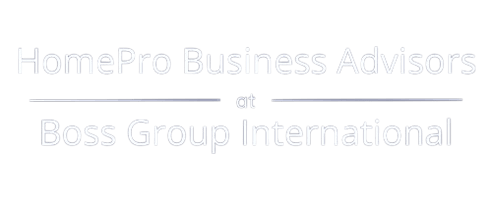Specializing in the Sale of Home Service Related Businesses
Thriving in Uncertain Times
Practical Strategies for Business Owners


Thriving in Uncertain Times: Practical Strategies for Home Service Business Owners
The current economic climate is causing concern for many business owners. Inflation, interest rates, and the prospect of trade tariffs are creating financial pressures that can impact profitability, cash flow, and long-term stability. However, home service businesses such as roofing, plumbing, HVAC, and landscaping, have always been resilient, adapting to changing market conditions and customer needs.
Rather than focusing on economic uncertainty as a problem, successful business owners should treat it as an opportunity to fine-tune their operations, strengthen customer relationships, and build a more resilient business. Here are several practical strategies to help home service business owners navigate these challenges and continue growing profitably.
1. Manage Costs Without Sacrificing Quality
One of the biggest concerns during periods of inflation is rising costs. Whether it’s materials, labor, or operational expenses, business owners must be proactive in cost management without cutting corners on service quality.
Strategies to control costs:
Negotiate with suppliers: If material costs are rising, talk to vendors about bulk discounts, longer-term contracts, or alternative products that offer the same quality at a lower price.
Optimize inventory management: Avoid stockpiling expensive materials unless necessary. Instead, use just-in-time inventory systems to reduce waste and improve cash flow.
Reassess expenses: Review your business’s spending and identify areas where you can cut unnecessary costs, such as unused software subscriptions or inefficient marketing campaigns.
Invest in training: A well-trained workforce is more productive and efficient, reducing errors and rework that can add to costs.
2. Optimize Pricing Strategies
With inflation increasing material and labor costs, adjusting pricing is necessary to maintain profitability. However, raising prices can be challenging, as customers may push back.
Smart pricing strategies include:
Value-based pricing: Focus on educating customers about the value you provide, rather than just the cost. Highlight quality workmanship, warranties, and superior service.
Gradual increases: Instead of one large price hike, consider small, incremental increases over time. This makes adjustments easier for customers to accept.
Upselling and bundling: Offer service packages or maintenance plans that increase customer value while improving your revenue per job.
Being transparent with customers about why prices are increasing can also help maintain trust and long-term loyalty.
3. Strengthen Cash Flow Management
During uncertain economic times, maintaining a healthy cash flow is crucial. Many businesses fail not because they are unprofitable, but because they run out of cash.
Ways to improve cash flow:
Invoice quickly and follow up on payments: Don’t let accounts receivable linger. Implement a system for prompt invoicing and follow up on overdue accounts. Consider offering small discounts for early payments.
Use technology for efficiency: Accounting and invoicing software can automate cash flow tracking, making it easier to forecast future financial needs.
Build a cash reserve: Having 3-6 months’ worth of operating expenses in savings can provide a safety net during slow seasons or economic downturns.
4. Focus on Customer Retention and Repeat Business
In times of economic uncertainty, acquiring new customers can be more challenging and expensive. It’s more cost-effective to retain existing customers and encourage repeat business.
Customer retention strategies include:
Exceptional service: Happy customers are more likely to refer others and return for future services.
Loyalty programs: Offer discounts or incentives for repeat customers, such as annual maintenance plans for HVAC or pool services.
Personalized communication: Follow up with past customers through emails, text messages, or postcards to remind them of seasonal maintenance or special offers.
Building strong customer relationships creates a reliable revenue stream and helps stabilize your business.
5. Invest in Smart Marketing
When economic times get tough, some businesses cut marketing to save money. However, this can backfire. Instead of stopping marketing efforts, focus on optimizing your strategy to maximize ROI.
Cost-effective marketing tactics:
Leverage local SEO: Ensure your business is listed in online directories like Google My Business, Yelp, and Angi to attract local customers searching for your services.
Encourage online reviews: Positive customer reviews help build trust and attract new business. Ask satisfied customers to leave reviews on Google or social media.
Use social media and email marketing: Posting helpful tips, customer testimonials, and special offers on social media and email newsletters keeps your business top of mind.
Referrals and partnerships: Partner with related businesses (e.g., realtors, home inspectors) to exchange leads and referrals.
Marketing doesn’t have to be expensive; it just needs to be strategic and targeted.
6. Adapt to Changes in Consumer Behavior
Economic shifts often change how and when customers spend money. Staying aware of these trends can help you adjust your services accordingly.
Ways to adapt:
Offer financing options: If interest rates are a concern for customers, providing financing plans can make larger jobs more accessible.
Flexible service options: Consider offering tiered service levels to accommodate different budgets.
Emphasize essential services: During tighter financial times, homeowners may prioritize repairs over upgrades. Highlight necessary services like maintenance, repairs, and energy-efficient solutions that save money in the long run.
Being flexible and customer-focused ensures that your business remains relevant and valuable.
7. Retain and Motivate Employees
Labor shortages and wage increases are ongoing challenges for home service related businesses. Retaining skilled employees is crucial to maintaining high service standards.
Employee retention strategies:
Competitive wages and benefits: If you can’t offer higher wages, consider other benefits like flexible schedules, performance bonuses, or training programs.
Positive work culture: A supportive and rewarding work environment helps reduce turnover and keeps employees motivated.
Training and advancement opportunities: Investing in your team’s growth increases job satisfaction and strengthens your business.
Happy employees provide better service, which leads to happier customers and a stronger reputation.
8. Stay Informed and Plan for the Future
Economic challenges will always be a factor, but businesses that stay informed and adaptable are the ones that thrive.
Ways to stay ahead:
Monitor industry trends: Stay updated on material costs, labor market conditions, and economic forecasts that could impact your business.
Regular financial reviews: Monthly or quarterly financial check-ins help you catch issues early and make informed decisions.
Have a long-term plan: Set clear business goals and have contingency plans in place for potential downturns.
Being proactive rather than reactive allows you to maintain control over your business’s future.
Final Thoughts
While inflation, interest rates, and other economic challenges can create uncertainty, they don’t have to dictate the success of your home service business. By focusing on cost management, pricing strategies, customer retention, marketing, and employee retention, you can strengthen your business and continue to grow, even in tough times.
Adapting to change and staying proactive will ensure your business remains profitable, resilient, and positioned for long-term success. Instead of worrying about what you can’t control, focus on the strategies you can implement today to keep your business running efficiently and profitably.
Contact us if you would like to discuss any specific aspects of your business strategy in more detail. Let’s work together to ensure your business not only survives but thrives!
HomePro Business Advisors at Boss Group International
Specializing in the sale of home service related businesses
© 2025. All rights reserved.
